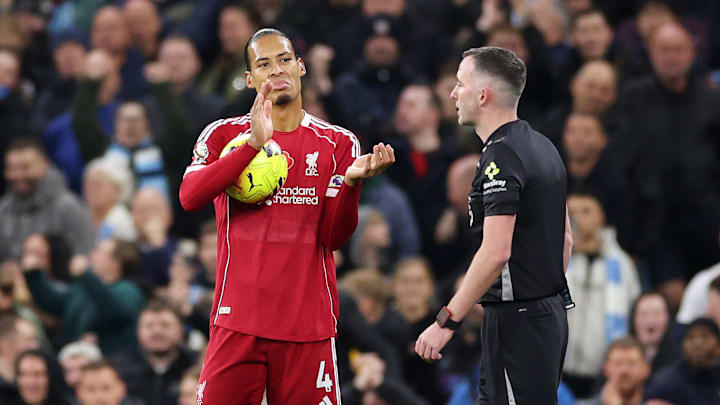Daily Mail Sport revealed that Liverpool contacted the PGMOL to ask for clarification over Virgil van Dijk’s disallowed goal in Sunday’s 3–0 loss to Manchester City. The club believes the VAR decision was based on a subjective interpretation and wants to know which elements of Law 11 were used to justify the offside ruling. The play, which could have leveled the match at 1–1, was canceled because of Andrew Robertson’s position, as he was deemed offside and interfering with City goalkeeper Gianluigi Donnarumma.
According to the law, a player should only be penalized if involved in “active play,” which includes touching the ball, challenging an opponent, or obstructing the opponent’s line of sight. The club’s intention is to understand the reasoning of the officiating team, led by Howard Webb, and prevent similar decisions from happening again without clear criteria.

Arne Slot avoids controversy but points to a clear mistake
After the match, head coach Arne Slot acknowledged City’s dominance but made his dissatisfaction with the decision clear. He said the situation didn’t affect the goalkeeper’s movement and that the goal should have stood. “He didn’t interfere with anything the goalkeeper could do,” the coach said. Slot also pointed out that the same referee had allowed a similar Manchester City goal last season, when Bernardo Silva stood on the goal line after a John Stones header against Wolves.
The coach noted that it took about 13 seconds for the assistant referee to confirm the offside, which reinforces the impression that there was communication between officials during the review. Still, he remained measured: “It was the wrong decision, but we didn’t lose the game because of it. Being 2–0 down at halftime reflected what the game was.”
The VAR debate and the search for consistency
The case reignited discussion about VAR use in the Premier League and the lack of consistency in officiating. For Liverpool, the issue isn’t just about a single mistake but the absence of clear standards that make the system unpredictable. The club wants to understand how a player’s position can be considered interference if he doesn’t touch the ball or block an opponent’s action.
The incident between Liverpool and City reinforces the idea that technology, rather than removing doubt, can produce different interpretations every week. And when a disallowed goal decides the rhythm of a high-profile match, the impact is unavoidable. Liverpool hasn’t blamed the defeat on the error, but the formal complaint shows the club is pushing for clarity in future reviews. Slot, for his part, stayed balanced, acknowledging City’s merit in the win.
